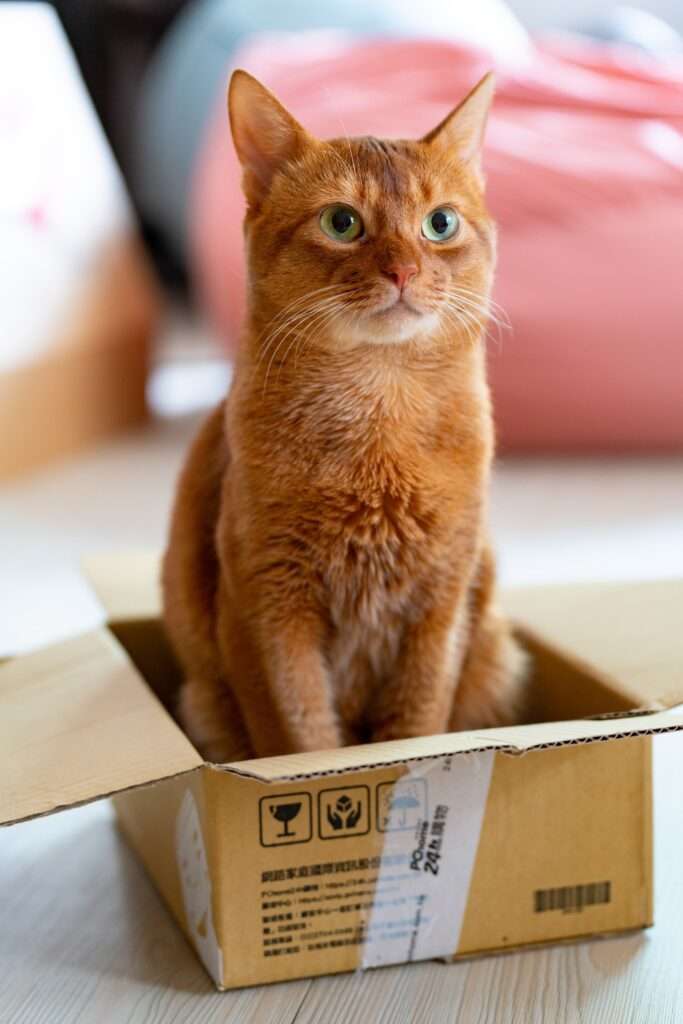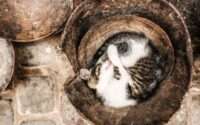How Long Does a Cat Hold a Grudge? From Hatred to Forgiveness
As passionate pet enthusiasts, we at BarkLikeMeow understand the deep bond that exists between humans and their beloved feline friends. Today, we delve into a topic that piques the curiosity of every cat lover: how long does a cat hold a grudge? As cat owners, we’ve all experienced those moments when our beloved furry companions seem to display an unyielding resentment.
In this in-depth exploration, we delve into the concept of feline grudges, aiming to separate fact from fiction and shed light on the truth behind this enigmatic behavior. By understanding how cats perceive and respond to negative experiences, we hope to provide valuable insights for cat owners, enabling them to cultivate stronger connections with their furry companions.
Decoding Feline Behavior

Before we embark on our quest to unravel the secrets of feline grudges, it is crucial to familiarize ourselves with the intricate world of feline behavior. Cats are known for their unique mannerisms and independent streak, which often shrouds their emotions in an air of mystique. To truly understand their capacity for holding grudges, we must first comprehend the core aspects of feline behavior.
From the regal arch of their backs to the subtle flick of their tails, cats possess a rich repertoire of body language signals that convey their emotions and intentions. Understanding these subtle cues is key to unraveling the complex tapestry of feline emotions. By paying attention to a cat’s posture, vocalizations, and facial expressions, astute cat owners can gain valuable insights into their furry friend’s state of mind.
Cats are natural predators and have inherited an instinctual need for territory. This territoriality, combined with their independent nature, can occasionally result in behaviors that might be mistaken for holding grudges. It is essential to differentiate between a cat’s natural instinct to protect its space and the potential harboring of resentment towards a specific individual or event.
In the following sections of this article, we will embark on a fascinating journey into the world of feline grudges. We will explore the factors that influence the duration of these perceived grudges and provide practical strategies for nurturing forgiveness and harmony within your feline-human relationship. So, grab a cup of tea, settle in, and let’s unravel the mystery together!
The Concept of Grudges in Cats
Now that we have laid the foundation by understanding feline behavior, let’s dive into the concept of grudges in cats. Cats, like humans, can experience negative emotions and respond to challenging situations. While they may not hold grudges in the same way we do, they do exhibit behaviors that might seem like lingering resentment.
A grudge, in the context of feline behavior, refers to a cat’s prolonged negative response or aversion towards a particular individual, event, or environment. These responses can manifest in various ways, such as avoidance, aggression, or destructive behavior. It is crucial to recognize that these behaviors are rooted in a cat’s instinctual need for self-preservation and their unique way of communicating discomfort.
Grudges in cats can be triggered by a range of circumstances, such as changes in routine, relocation, encounters with unfamiliar animals or humans, or even medical procedures. It is important to note that a cat’s response to these triggers might not be immediate, and it can take time for their negative feelings to manifest. This delayed response can sometimes create the impression that cats hold grudges.
The Role of Memory in Feline Grudges
To truly understand the duration of a feline grudge, we must explore the role of memory in a cat’s emotional landscape. Cats possess impressive memory capacity and retention abilities, which play a significant role in their responses to negative experiences.
Episodic memory, the ability to recall specific events or episodes, is a crucial aspect of feline memory. Cats can remember past events, both positive and negative, and use these memories to navigate their surroundings and make future judgments. This memory recall can influence their behaviors and responses towards individuals or situations associated with negative experiences.
Scientific studies have shed light on the memory capabilities of cats. Research suggests that cats can remember both positive and negative experiences for extended periods. In fact, they can recall and associate specific individuals or situations with negative encounters, which may contribute to the perceived grudge-holding behavior.
However, it is important to remember that memory alone does not determine the duration of a feline grudge. Other factors, such as the intensity and duration of the negative experience, the bond with the offending entity, and the cat’s temperament, also play significant roles.
Factors Influencing Feline Grudge Duration
As we continue our quest to unravel the secrets of feline grudges, it becomes apparent that the duration of such perceived resentments can vary widely. Several factors contribute to how long a cat may hold onto negative emotions. Let’s explore these factors and gain a deeper understanding of their impact on feline grudge duration.
- Duration of the Negative Experience: The intensity and duration of a negative experience play a crucial role in a cat’s ability to forgive and move forward. Cats are remarkably perceptive creatures, and an extended or particularly distressing event can leave a lasting impression on their memory. In such cases, the grudge-holding behavior may persist for an extended period.
- Bond with the Offending Entity: The nature of the bond between a cat and the individual or animal responsible for the negative experience influences the forgiveness timeline. Cats have distinct relationships with their owners, other pets in the household, and even strangers they encounter. A stronger bond can facilitate quicker forgiveness, while a weaker bond may prolong the grudge.
- Temperament and Personality Traits: Just like humans, cats possess individual temperaments and personality traits that shape their responses to negative experiences. Some cats are more resilient and adaptable, while others may be sensitive or more prone to holding onto negative emotions. These unique traits can impact the duration of a feline grudge.
- Socialization and Early Experiences: A cat’s early life experiences, particularly during the critical socialization period, can significantly influence their ability to forgive. Cats that receive positive interactions, exposure to various environments, and gentle handling during this period are more likely to develop resilience and a forgiving nature. Conversely, cats lacking proper socialization may exhibit grudge-holding behavior for a longer time.
Understanding these dynamics will empower cat owners to navigate challenging situations with empathy, patience, and effective strategies for fostering forgiveness and harmony in their feline-human relationships.
Signs of a Cat Holding a Grudge
While cats cannot communicate their emotions verbally, they rely on subtle cues and body language to express their feelings. Recognizing the signs of a cat holding a grudge is essential for cat owners to address any underlying issues and work towards reconciliation. Here are some common signs to look out for:
- Avoidance: A cat holding a grudge may actively avoid interactions with the person or animal they associate with the negative experience. They may retreat to secluded areas or display an aloof demeanor.
- Aggression: In some cases, a cat may respond to a grudge by displaying aggressive behaviors. This can range from hissing, swatting, or biting when approached or provoked.
- Destructive Behavior: Cats harboring negative emotions may exhibit destructive behaviors, such as scratching furniture, urinating outside the litter box, or engaging in excessive grooming.
- Change in Body Language: Watch for changes in your cat’s body language. They may display tense posture, flattened ears, dilated pupils, or a twitching tail as signs of lingering resentment.
- Altered Appetite or Grooming: A cat holding a grudge may exhibit changes in their eating habits or grooming routines. They may lose their appetite or become compulsive groomers, manifesting as excessive licking or fur pulling.
By observing these behavioral cues, cat owners can gain valuable insights into their feline friend’s emotional state and take appropriate steps to address the underlying grudge. Patience, understanding, and effective strategies can help mend the bond and restore harmony in the feline-human relationship.
Strategies for Mending Feline Grudges
While feline grudges may test the patience of cat owners, there are practical strategies that can help mend the rift and foster forgiveness. By implementing these strategies with care and consistency, you can work towards rebuilding trust and strengthening the bond with your feline companion. Let’s explore some effective techniques for mending feline grudges:
- Creating a Positive Environment: Establishing a safe and stress-free environment is crucial for a grudge-holding cat. Ensure they have access to comfortable hiding spots, vertical spaces, and designated areas for scratching and play. Consistency in routine and a predictable schedule can help alleviate anxiety and promote a sense of security.
- Bonding Activities: Engage in interactive play sessions with your cat using toys that encourage physical exercise and mental stimulation. Grooming sessions can also be a bonding experience, fostering trust and positive associations. Remember to be gentle and patient, allowing your cat to dictate the pace of interaction.
- Patience and Time: Mending a feline grudge requires patience and understanding. Avoid forcing interactions or expecting immediate forgiveness. Allow your cat to set the pace and gradually reintroduce positive experiences. Respect their boundaries and offer reassurance through gentle words, treats, and affection when they are receptive.
- Positive Reinforcement Training: Utilize positive reinforcement techniques to reward desired behaviors and redirect negative ones. Reward your cat with treats, praise, or play when they engage in friendly interactions or display signs of progress. This approach encourages trust-building and reinforces positive associations.
By implementing these techniques, cat owners can create an environment of trust, love, and understanding, ensuring a harmonious and fulfilling relationship with their feline companions. So, let’s continue our exploration and discover the path to reconciliation together!
Seeking Professional Help
In some cases, professional help may be necessary to address deeply rooted feline grudges and resolve underlying behavioral issues. Veterinary professionals and certified animal behaviorists have the expertise to assess your cat’s unique situation and provide guidance tailored to their specific needs. Here are some instances where seeking professional help is recommended:
- Prolonged Grudge Holding: If your cat’s grudge persists despite your best efforts and has a significant impact on their overall well-being, consulting a professional can provide valuable insights and a fresh perspective.
- Aggressive Behavior: If your cat’s grudge manifests as aggressive behavior, seeking professional help is essential for the safety of both your cat and those around them. A behaviorist can assess the underlying causes and develop a behavior modification plan to address the aggression.
- Extreme Stress or Anxiety: Cats experiencing severe stress or anxiety due to a grudge may require professional intervention. A veterinarian or behaviorist can evaluate the situation, rule out any underlying medical conditions, and recommend appropriate management strategies or medications if necessary.
Remember, seeking professional help is not a sign of failure but a proactive step towards ensuring your cat’s well-being and fostering a harmonious relationship. They can provide expert guidance, tailor solutions to your cat’s specific needs, and support you throughout the healing process.
Conclusion
In this captivating exploration of feline grudges, we have peeled back the layers of mystery surrounding our enigmatic feline friends. While cats may exhibit behaviors that resemble holding grudges, it is important to understand their unique nature and the factors that contribute to these perceived resentments.
We discovered that cats’ responses to negative experiences are influenced by a variety of factors, including the duration and intensity of the event, the bond with the offending entity, and their individual temperament. Understanding these dynamics provides valuable insights into the duration of a feline grudge and paves the way for effective strategies to mend the rift.
By creating a positive environment, engaging in bonding activities, practicing patience and understanding, and utilizing positive reinforcement training, cat owners can work towards rebuilding trust and fostering forgiveness. It is a journey that requires dedication, but the rewards of a harmonious relationship with your feline companion are immeasurable.
As we conclude our exploration, we invite you to embark on this transformative journey of mending feline grudges with hope and optimism. Remember, each cat is a unique individual, and the timeline for forgiveness may vary. Patience, empathy, and consistent effort will pave the way for a deeper connection and a bond that can withstand any grudge.
May your path be filled with love, understanding, and endless purrs of contentment. Cheers to a future where grudges are but a fleeting memory, and the harmony between cats and their humans knows no bounds!
Frequently Asked Questions
Q: How long does a cat hold a grudge?
A: The duration of a cat’s grudge can vary depending on several factors, including the intensity and duration of the negative experience, the bond with the offending entity, and the cat’s individual temperament. Some cats may hold grudges for a short period, while others may carry them for longer.
Q: Can a cat’s grudge last indefinitely?
A: While some cats may hold grudges for an extended period, it’s important to remember that with patience, understanding, and consistent effort, most cats can eventually let go of negative emotions and move towards forgiveness. Creating a positive environment and engaging in bonding activities can help facilitate this process.
Q: Are all cats prone to holding grudges?
A: Each cat has its own unique personality and temperament. While some cats may be more prone to holding grudges, others may be more forgiving and adaptable. Early socialization and positive experiences can help foster resilience and a forgiving nature in cats.
Q: What are the signs that a cat is holding a grudge?
A: Cats may exhibit various signs when holding a grudge, including avoidance, aggression, destructive behavior, changes in body language, and altered appetite or grooming habits. It’s important to observe these behavioral cues and take appropriate steps to address any underlying issues.
Q: Can a cat hold a grudge against multiple individuals?
A: Yes, cats can hold grudges against multiple individuals, especially if they associate them with negative experiences. It’s important to address and resolve any underlying issues with each individual involved to facilitate forgiveness and rebuild trust.
Q: Can a cat’s grudge be triggered by specific stimuli or reminders?
A: Yes, certain stimuli or reminders of negative experiences can reignite a cat’s grudge. It could be a specific scent, sound, or even a particular person or object. Understanding these triggers can help you avoid potential conflicts and work towards resolving the grudge.
Q: How can I mend a grudge with my cat?
A: Mending a grudge with a cat requires patience, understanding, and consistent effort. Creating a positive environment, engaging in bonding activities, practicing positive reinforcement training, and seeking professional help when necessary are all effective strategies to mend the grudge and rebuild trust with your cat.
Q: Can professional help be sought to mend a cat’s grudge?
A: Yes, in some cases, professional help may be necessary, especially if the grudge persists or escalates into aggressive behavior. Veterinary professionals and certified animal behaviorists can provide expert guidance, assess the situation, and develop tailored strategies to mend the grudge and promote a harmonious relationship.
Remember, every cat is an individual, and the timeline for forgiveness may vary. With love, patience, and the right approach, most cats can eventually let go of grudges and restore harmony in the feline-human relationship.





